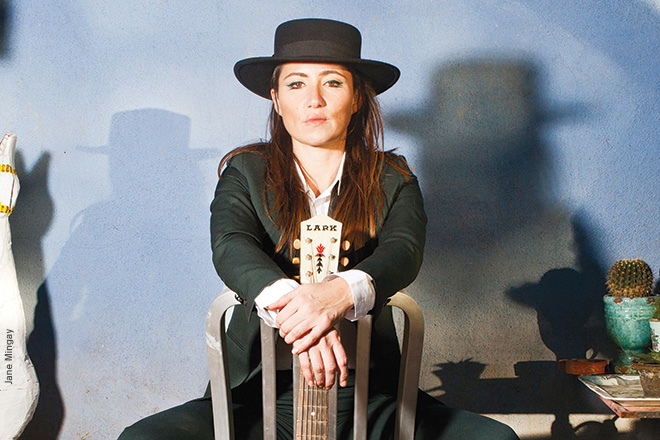 KT TUNSTALL
KT TUNSTALL
The pop folkie kicks expectations to make her own kind of music
For KT Tunstall, the catalyst for her fourth album, Invisible Empire // Crescent Moon, was meeting veteran rocker Howe Gelb, frontman for Giant Sand. The Scottish singer-songwriter, 38, accepted Gelb’s invitation to record in Tucson, Ariz. Looking only to experiment with sounds, Tunstall came away with a collection of Americana-inspired songs—a marked departure from her pop sound. “It’s really my purest album,” says Tunstall, who broke through with her 2004 debut album Eye to the Telescope. “I was completely left to my own devices to make this album with no interference whatsoever. It’s what you dream about as an artist.”
What inspired this record?
The most important factor was meeting Howe Gelb. We had been on a tour that Robyn Hitchcock put together, and we hit it off immediately. After a few gigs he said, “I think you would really enjoy coming out and recording in Tucson.” He recognized I was stuck in a bit of an eddy in terms of being on a major label and what that entails, and what—especially after having success on the first album—that can do to you psychologically, feeling like there’s pressure to try and strike gold again. It’s not helpful to feel that’s something you have to re-create when you’re trying to make music.
Do you feel pressure to have hits?
There’s always this feeling of disappointment when you put a record out and it doesn’t do what your big album did. I never knew that. I was never yearning for another big, commercial success. Howe really represented a very nonconformist, maverick attitude to making music. I recognized that I would get a lot out of working with him because of that.
Did you have songs already written?
When Howe asked me to go I didn’t have any songs, but by the time I went, I wrote nine in two months—which was a lot for me. The first session was really just getting those songs recorded, getting them down. The second session—the Crescent Moon half of the record—was written when I was there, when I was in a very different place. By then I already knew Tucson and knew the musicians, so there’s quite a different feeling to it.
What was the initial session like?
I didn’t have massive expectations of the first session. I really didn’t know what was going to happen. I told my A&R guy, “This is either going to be a pricey experiment or a very cheap album.” The real joy of this album is the fact that I didn’t care who liked it or who listened to it. It was just about making what I wanted to make, finally, without putting any pressure on myself. That was a very liberating experience.
Were you trying to avoid pop songs?
Genre has never been a particularly useful tool for me. Pop to me means that it’s an accessible song. It’s not niche. It’s unfortunately been stolen and used as a dirty word in modern music, which is a great shame because there’s incredible pop music now and from the past. But I’ve never considered myself a pop star or a pop writer. I’m a singer and musician, and I come from a folk background. There are a lot of different types of music that I’m interested in. Howe was a real joy to work with in terms of helping me break out of that formulaic approach. It was really great for me to not feel I needed to adhere to any framework for what I was writing. I could go with what came out.
–Amanda Farah



comment closed